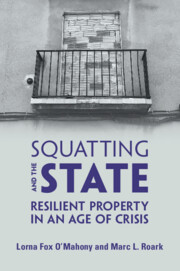Book contents
- Squatting and the State
- Squatting and the State
- Copyright page
- Dedication
- Contents
- Preface and Acknowledgments
- Introduction Squatting, Scale, and the State
- Part I Squatting and the State
- 1 States, Narratives, and Norms
- 2 Squatting and the Law
- 3 Property Theory and the State
- 4 Scaling the State
- Part II Resilient Property in an Age of Crises
- Part III Resilient Property in Action
- Bibliography
- Index
4 - Scaling the State
from Part I - Squatting and the State
Published online by Cambridge University Press: 11 August 2022
- Squatting and the State
- Squatting and the State
- Copyright page
- Dedication
- Contents
- Preface and Acknowledgments
- Introduction Squatting, Scale, and the State
- Part I Squatting and the State
- 1 States, Narratives, and Norms
- 2 Squatting and the Law
- 3 Property Theory and the State
- 4 Scaling the State
- Part II Resilient Property in an Age of Crises
- Part III Resilient Property in Action
- Bibliography
- Index
Summary
The scaling-back, scaling-up, and scaling-down of liberal nation states since the 1970s have fundamentally changed the contexts in which state responses to squatting must be understood. The impacts of neoliberalism, globalization, and localism – scaling-back, scaling-up, and scaling-down the nation-state – have provoked new questions for liberal property theories. While the foundations of the classical nineteenth century liberal state and twentieth century liberal ownership societies – which underpin liberal theories of private property – have shifted, the “invisibility” of the state in liberal property theories has meant that this fundamental change has attracted relatively little attention. Against the backdrop of the global financial crisis and Great Recession, the politics of “austerity” and affordable housing crises, the re-emergence of squatting as an issue of political concern and the use of state power to respond to unlawful occupation have re-positioned debates about “private property” in the public realm. For property scholarship to succeed in understanding and advancing solutions to contemporary property problems, it is important that our theoretical and methodological frameworks are attuned to the real contexts of state action.
Keywords
- Type
- Chapter
- Information
- Squatting and the StateResilient Property in an Age of Crisis, pp. 165 - 200Publisher: Cambridge University PressPrint publication year: 2022



